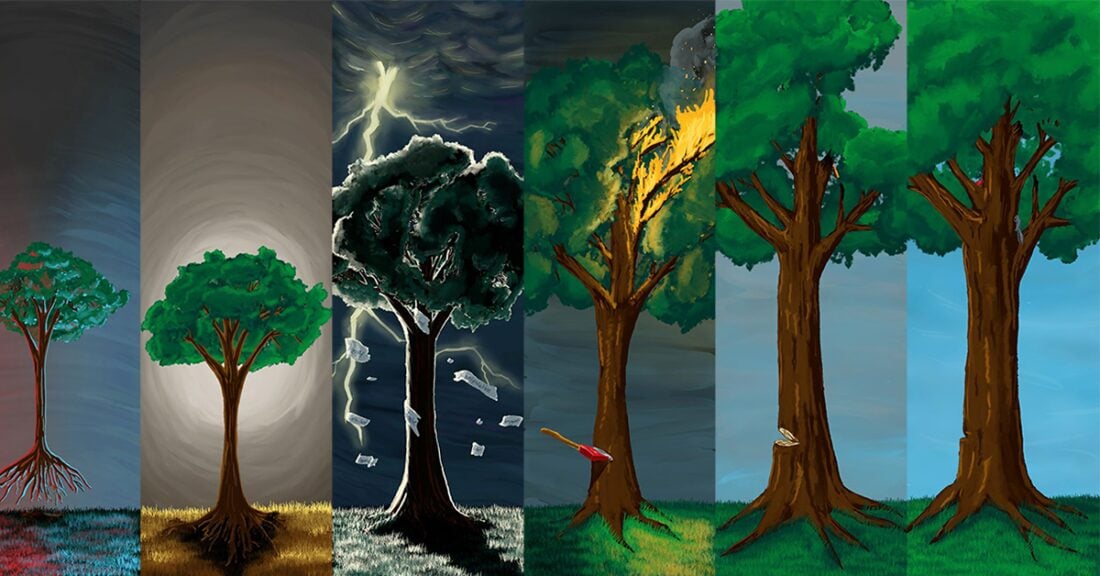Kentucky Youth Use the Arts to Spotlight Child Welfare Inequities

Artwork created for the Truth Telling Circles project by three young adults: Timothy Bowen, Tia Humphrey and Mary-Rachel Starnes
In Kentucky, young people who have spent time in foster care are using art, spoken word and music to highlight racial inequities in the state’s child welfare system. The program, called Truth Telling Circles, advocates for systemic changes to improve the experiences of Black youth, who represent 8.6% of the state’s population yet make up 10% of children in the state’s foster care system. On average, 15% of Black children age out of care and spend a longer time in care than white children.
Through TTC, youth who’ve been in foster care share their experiences with those who can influence change — child welfare leaders, caseworkers and direct care staff. Each circle includes a Q&A session where participants can engage directly with the young people on the issues they’ve faced. This helps Black, Latino and Native families avoid unnecessary system involvement, leading to improved well-being and community engagement as well as increased opportunities for youth.
TTC, part of the Thriving Families, Safer Children initiative, started as a two-year pilot led by the Kempe Center, the University of Louisville and Kentucky Youth Advocates (KYA), which guided implementation of the project. With renewed funding from the Annie E. Casey Foundation, TTC will continue into 2025.
“Sharing my testimony through art elicited a response I had never experienced [while] presenting,” said Tia Humphrey, a young adult co-leading truth telling work with KYA. “I could feel a stronger connection, understanding and purpose, not just with myself, but with all the art created through the project.”
From Listening to Action
Inspired by Together in Truth, an organization advocating for young people and parents who’ve been separated, the first year of the pilot saw the KYA planning team working with young people to develop a handbook to guide implementation. A top priority that emerged from early discussions was the need for prevention-focused efforts, particularly those involving financial resources and case management for birth parents to prevent child removal and placement in foster care. Acknowledging the harm separation does to young people and parents, the team worked to create a framework for meaningful, effective storytelling that encourages system leaders to improve child welfare.
“The Truth Telling Circle allowed a deeper insight into the stories of youth and a better understanding of the impact of systems on their lives,” said Lorraine Wilbur, a Chafee program administrator for Kentucky’s Department for Community Based Services who attended. “The circles really made it clear how changes in child welfare must start with our community and society.”
Preparing young people to share their stories in such a powerful way required extensive planning and support, including:
- requiring training on deciding what they were comfortable sharing, how to adapt their stories in real-time and an understanding of the cultural significance of circles;
- creating team bonding opportunities, so that they feel comfortable sharing their experiences in front of others;
- building an agenda to ensure clear roles and expectations are established;
- hosting debriefs where they can reflect on their experience sharing; and
- funding group outings or individual self-care activities for them to decompress after each circle session.
“This project proved to me that incorporating lived expertise at the front of the table is not only empowering for the experts but is a continuous reminder of the partnership that is essential to make the necessary changes we want within the system,” said Humphrey. “Because of this experience, I have been featured in articles and international journals and facilitated trainings to help organizations work with other lived experts.”
What’s Next for Truth Telling Circles?
Through the next year, KYA plans to host additional circles and train more young adults as circle leaders, with previous participants serving as peer mentors to new cohorts. Additionally, the organization aims to engage a broader range of stakeholders, including judges, as circle attendees and conduct deeper research on how disparities in Kentucky’s child welfare system affect Black families.
“We hope the Truth Telling Circles project can serve as a model for including the perspectives of young people and others who have experienced systems,” said Felicia Kellum, a senior associate with the Casey Foundation’s Family Well-Being Strategy Group. “Ensuring their voices are not just heard but are instrumental in addressing issues of race equity and inclusion and preventing families from entering the system in the first place are core guiding principles of the Thriving Families, Safer Children [initiative].”
Read a Q&A on building trust and collaboration for equitable decision making
Listen to a Community In-Site episode featuring Kentucky Youth Advocates






